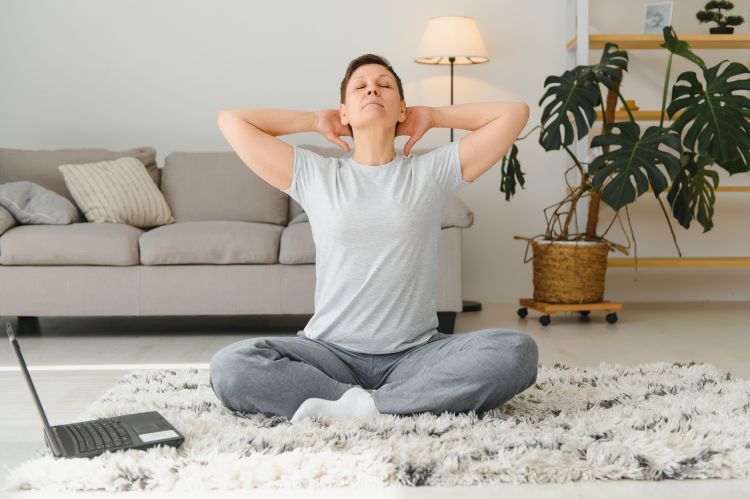
10 Ways to Prioritize Mental Health
"Mental health…is not a destination, but a process. It’s about how you drive, not where you’re going." — Noam Shpancer, PhD
Millions of people across the United States are affected by mental illness, and global shifts are impacting how children and adults cope, treat and talk about mental health. One in five adults in the U.S. experience mental illness yearly, from anxiety and depression to addiction and substance abuse. Although younger generations continue to destigmatize mental illness and Americans are prioritizing mental health, many continue to live with untreated mental health disorders. Less than half (46.2%) of U.S. adults with mental illness received treatment in 2020, and annual treatment rates are even lower among men (37.4%) compared to women (51.2%). The reasons why Americans fail to treat their mental illnesses range from lack of insurance to residing in an area with a shortage of mental health professionals.
Amid a mental health crisis and a shortage of mental health professionals, graduates from an online Master’s in Mental Health Counseling are essential to prevent, diagnose, and treat increasingly prevalent mental illnesses. Seeking professional help and meeting with a clinical mental health counselor is only one of the ways you can start prioritizing mental health.
How To Take Care Of Your Mental Health
Table of Contents
- Eat for your brain
- Hack your chemistry with exercise
- Don't underestimate the power of sleep
- Mind what you think
- Invest in your social connections
- Start a mindfulness practice
- Develop a routine
- Set boundaries at work
- Challenge negative self-talk
- Meet with a Clinical Mental Health Counselor
“By taking care of myself, I have so much more to offer the world than I do when I am running on empty.” – Ali Washington
Prioritizing mental health is a journey that requires continuous effort. In the same way our bodies need fuel, rest, and movement to function well, our minds must receive the same care and attention to operate. If you’re wondering how to take care of your mental health, the foundational pillars of health are often underestimated and highly effective. However, suppose you are living with undiagnosed or untreated mental illness. In that case, you should consult with a doctor or visit a clinical mental health professional to investigate further treatment options.
1. Eat for your brain

"We are not our trauma. We are not our brain chemistry. That’s part of who we are, but we’re so much more than that." ― Sam J. Miller
You are what you eat. This statement couldn’t be more relevant when it comes to mental health. Diet and nutrition influences brain chemistry and gut health. Recent studies show that the human gut and microbiome act like a “second brain.” The same studies indicate that the gut-brain connection may trigger emotional shifts experienced by people coping with irritable bowel syndrome (IBS) and functional bowel problems such as constipation, diarrhea, bloating, pain, and stomach upset. “For decades, researchers and doctors thought that anxiety and depression contributed to these problems. But our studies and others show that it may also be the other way around,” says Jay Pasricha, M.D., director of the Johns Hopkins Center for Neurogastroenterology. This research shows that irritation in the gastrointestinal system may send signals to the central nervous system that trigger mood changes and may contribute to mental health disorders. To support a healthy gut and therefore support mental wellness, you can:
- Reduce foods that are processed or high in sugar
- Take prebiotics and probiotics or eat more fermented foods
- Check if you have food intolerances and remove them from your diet
- Eat more fruits, vegetables, and other whole foods
- Consume a high-fiber diet
2. Hack your chemistry with exercise

"Sometimes self-care is exercise and eating right. Sometimes it’s spending time with loved ones or taking a nap. And sometimes, it’s watching an entire season of TV in one weekend while you lounge around in your pajamas. Whatever soothes your soul." — Nanea Hoffman
New research suggests that physical activity and regular exercise impact more than just our bodies. It contributes to mental wellness and boosts the hormones in your body that make you feel content, satisfied, and happy. Researchers examined 1,158 studies and 89% found a statistically significant, positive association between physical activity or exercise and mental health. Three primary exercises were linked closely to better mental health, including general physical activity, cardiovascular/aerobic physical activity, and yoga. If you’re experiencing symptoms associated with mental illness, including depression, it may feel daunting to get out and move your body. There are several ways you can make regular exercise part of your routine, including:
- Try new exercises and gravitate to the ones that bring you joy
- Find an accountability partner who will join virtual yoga sessions or go for walks with you
- Schedule exercise in your calendar to make movement a commitment
- Focus on how you feel after exercising rather than how it may alter your body long-term
3. Don’t underestimate the power of sleep

“Mental health is just as important as physical health and deserves the same quality of support.” — Kate Middleton
All too often, people underestimate the power of sleep. Sleep length and quality significantly impact how our minds and bodies function. Every stage of the sleep cycle affects brain health, enabling better thinking, learning, and memory. Research also shows poor sleep worsens mental health disorders, including depression, anxiety, schizophrenia, and ADHD. If you want to build a holistic plan to better your mental health, you can start by improving sleep quality by engaging in the following:
- Implement “sleep hygiene” by setting a consistent bedtime, switching off electronics before bed, blocking out excess light, and only using your bedroom for rest and relaxation
- Trial cognitive-behavioral therapy (CBT) to calm your thinking before bed
- Keep a sleep journal and write down how many hours of sleep you get each night and how it correlates to how you feel that day or week
4. Mind what you drink

“Take a shower, wash off the day. Drink a glass of water. Make the room dark. Lie down and close your eyes. Notice the silence. Notice your heart. Still beating. Still fighting. You made it, after all. You made it another day. And you can make it one more. You’re doing just fine.” ― Charlotte Eriksson
Although maintaining a healthy food diet is instrumental in any given mental health journey, becoming mindful of what you drink may be equally as impactful. Sources show that consuming too much alcohol or caffeine can exacerbate mental health issues. “Alcohol increases the risk of depression, and depression increases the risk of alcohol use,” says Alexander Blount, a psychologist and professor emeritus of family medicine at the University of Massachusetts Medical School. Bount also reports that too much caffeine throughout the day can also increase existing feelings of stress and anxiety. To improve your relationship with these substances, try to:
- Fill several large water bottles and finish them before the end of the day
- Limit caffeine and alcohol at least 4-6 hours before bed
- Limit caffeine and alcohol intake to fewer days during the week or month
- Replace your favorite caffeinated or alcoholic beverages with pleasant alternatives like flavored or sparkling water, or caffeine-free and alcohol-free alternatives
5. Invest in your social connections

"Just because no one else can heal or do your inner work for you doesn’t mean you can, should, or need to do it alone." – Lisa Olivera
Humans are innately social creatures who crave community and connection to feel fulfilled and content. Throughout the COVID-19 pandemic, people worldwide grappled with social isolation and loneliness. Studies show that social connection is linked to mental wellness and a lack of social connection leads to higher rates of obesity, smoking, and high blood pressure. Strong social connections were positively correlated to a 50% increased chance of longevity. Moreover, the same studies show that deeply connected people have lower rates of anxiety and depression, higher self-esteem, higher rates of empathy, and better emotional and physical well-being. To boost your social well-being and invest in your relationships, you can:
- Schedule a day and time to call friends and family so that you can maintain connections even when life gets busy
- Join outside activities or sports to build a like-minded community and foster new connections
- Plan events and hangouts to maintain long-lasting friendships and follow through with commitments
- Connect with far-away friends and family in video calls, group chats, and social media platforms when you feel isolated or alone
Learn about SBU's Online Master's in Mental Health Counseling
6. Start a mindfulness practice

"Feelings come and go like clouds in a windy sky. Conscious breathing is my anchor.” – Thich Nhat Hanh
Meditation is increasingly mainstream, and mindfulness practices are gaining attention. However, many people struggle to sit down and dedicate time to just breathe and do nothing. Developing a mindfulness practice is like going to the gym for your mind. When you first return to the gym, the exercises may feel tiresome and challenging, however, the more consistent you become, the stronger you are; meditation is similar. Sources show that meditation is backed by science and provides numerous benefits, including increased focus and concentration, improved self-awareness and self-esteem, lower levels of stress and anxiety, and even higher levels of kindness. Regular meditation is also shown to decrease stress, lower blood pressure, and reduce symptoms of anxiety and depression. You can start your own mindfulness practice by doing the following:
- Find a quiet place where you won’t be disturbed
- Start small with a 2-minute meditation and build your time to 5, 10, or 20 minutes at a time
- Use a meditation app like Insight Timer or Headspace to guide you
- Set a time of day (morning or before bed) to meditate every day
- Trial different meditation techniques, including body-scan meditation, mindful breathing, and walking meditation, to determine which style works best for you
7. Develop a routine

"Self-care is how you take your power back." — Lalah Delia.
Make prioritizing mental health part of your daily life by implementing a consistent routine. Healthcare providers encourage patients to implement routines to support lifestyle changes that ultimately improve their health and quality of life. Building healthy habits doesn’t happen overnight; changing your habits is a conscious decision that takes place every day. Adding the suggestions listed above, such as a new workout schedule, eating plan, sleep routine, and daily meditation requires planning. To develop habits that stick, start with the following tips from the book Atomic Habits:
- Make new habits obvious, attractive, easy, and satisfying to encourage consistency (Ex. prepare healthy foods that taste good ahead of time)
- Try habit stacking by adding a new habit to an existing habit (Ex. meditate right after you brush your teeth)
- Change your environment to curb unhealthy habits and encourage new ones (Ex. charge your phone outside of your bedroom before you go to sleep)
- Build a tribe of healthy individuals who support and motivate you
- Start a habit tracker where you check off every time you complete a good habit (Ex. mark down your workouts on a calendar)
- Reward yourself when you succeed (Ex. if you successfully meditate every day of the month, treat yourself to a healthy purchase or experience)
8. Set boundaries at work

“Part of my identity is saying no to things I don’t want to do… I check in with myself throughout the day, and I say, ‘Do I really want to do this?’ and if the answer is no, then I don’t do it. And you shouldn’t either.” — Lady Gaga
As more organizations and employees move to remote work models, the boundary between home and work life often dissolves. Work may contribute to higher levels of stress which can impact mental health. If you’re feeling overwhelmed with work, start by creating boundaries that protect your out-of-office time. To develop a better work-life balance, start by implementing the following:
- Communicate openly and honestly with your boss about your bandwidth and workload
- Establish clear work hours and do not check emails or perform work duties outside of work hours
- Take your vacation time and use your newfound meditation practices to mitigate intrusive thoughts about work during the time for relaxation
- Write down your values and evaluate what comes first on your list, work, relationships, health, etc. and live your life according to those values by dedicating time to what is most important to you
9. Challenge negative self-talk

“Start listening to the way you talk to yourself. These interactions will tell you how well you know yourself, how much you respect yourself, and what boundaries you are lacking.” — Sara Kuburic
Reframing negative thoughts is one of the most powerful tools for transformation. Reframing negative thoughts into positive thinking has numerous health benefits. According to the Mayo Clinic, positive thinking can increase your lifespan, lower your risk of depression, improve your cardiovascular health, and provide better coping skills during stressful times. You can start challenging negative thoughts and replace them with positive thinking patterns by engaging in the following:
- Identify your negative self-talk and label it as one of the following:
- Filtering: Focusing exclusively on the negative parts of a situation and disregarding the positive.
- Personalizing: Seeing yourself as the sole cause of adverse events.
- Catastrophizing: Automatically anticipating the worst outcome.
- Polarizing: Viewing circumstances as good or bad with no middle ground.
- Decide which negative thoughts you must reframe
- Examine the evidence by asking the following questions:
- How likely is it that the negative scenario will happen?
- How often has the negative scenario occurred in the past?
- What is the worst possible outcome of the negative scenario?
- How likely is the worst possible outcome likely to happen?
- Can you handle it if it does?
10. Meet with a Clinical Mental Health Counselor

“What I love about therapy is that they’ll tell you what your blind spots are. Although uncomfortable and painful, it gives you something to work with.” — Pink
A Clinical Mental Health Counselor is trained to support individuals, families, and groups to overcome personal challenges and accomplish their goals. If you’re struggling with mental health concerns, consulting a professional can help you set goals, explore treatment options, and implement real changes that improve your quality of life.
Help Others Prioritize Mental Health With a Master’s in Clinical Mental Health Counseling
St. Bonaventure University offers a CACREP-accredited online Master of Science in Education – Clinical Mental Health Counseling that provides a supportive pathway to licensure. Courses are delivered 100% online in a dynamic virtual environment, combining flexibility, quality, and value. Through engaging coursework and in-field practice, understand the specific needs of communities and populations, and gain strategies to improve their outcomes through various counseling practices, including crisis counseling, addiction counseling, research methods, and more.
As a student of our online MSED Clinical Mental Health Counseling program, you will:
- Prepare to meet all the requirements of a licensed professional counselor. At St. Bonaventure, 95% of our program graduates pass the licensed professional counselor exam.
- Receive dedicated support from enrollment through graduation. You will get guidance and assistance from your student support advisor and internship placement coordinator, who will find sites in your local area.
- Embark on an educational path that combines quality and affordability. St. Bonaventure is ranked as a Top 5 Best Value School by the U.S. News & World Report and our Clinical Mental Health Counseling graduate program is ranked as a Top 10 Best Online Master's in Mental Health Counseling by CounselingDegreeGuide.org.
Learn about SBU's Online Master's in Mental Health Counseling
